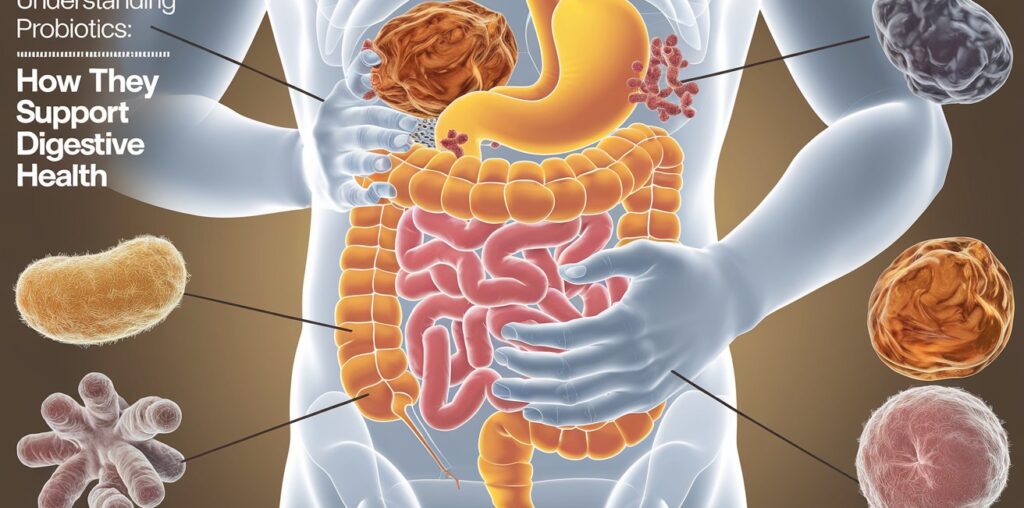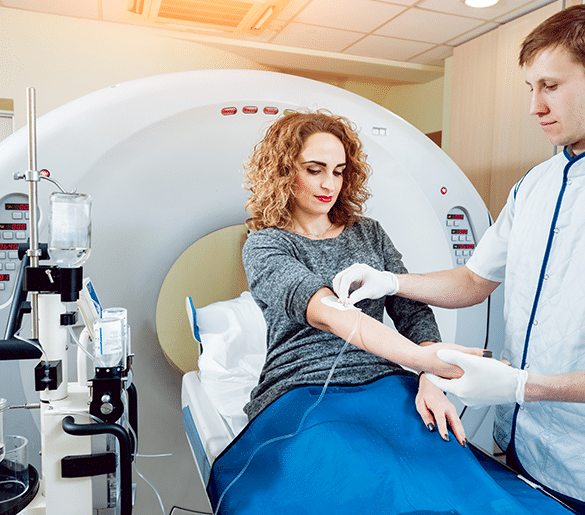Did you know that a whopping 77% of U.S. adults reported consuming dietary supplements in 2019? Among them, probiotics have gained immense popularity for their potential to support digestive health. These “good bacteria” act like tiny soldiers in our gut, fighting to maintain a balanced microbiome essential for overall well-being. In this article, we will explore the fascinating world of probiotics, their benefits, and how they contribute to a healthier digestive system.
What You Need to Know
- Probiotics are live microorganisms that provide health benefits.
- They support digestive health and overall well-being.
- Probiotics can be found in supplements and fermented foods.
- Consult a healthcare professional before starting probiotic supplements.
The Basics of Probiotics
Probiotics are defined as live microorganisms that confer health benefits when administered in adequate amounts. These tiny allies are not just passengers in your gut; they actively contribute to digestion, immune function, and even weight management. Emerging research indicates that maintaining a diverse community of gut bacteria is crucial for overall health. To learn more about the types of probiotics, check out this informative resource.
Probiotics can be found in various forms, including supplements and fermented foods like yogurt, kefir, and sauerkraut. Each source offers unique strains that can provide specific health benefits, much like a toolbox filled with different tools for various tasks. As you consider adding probiotics for your gut health to your routine, remember to consult with a healthcare professional to find the best option suited to your needs. For a deeper understanding of probiotic-rich foods, explore the extensive information available.
The Human Microbiome and Digestive Health
The gut microbiome, a complex ecosystem of approximately 200 different species of bacteria, viruses, and fungi, plays a pivotal role in our overall health. This diverse community of microorganisms impacts everything from digestion to immune response. When the balance of these bacteria is disrupted, it can lead to digestive issues and other health problems. Therefore, nurturing a healthy microbiome is essential for maintaining optimal digestive health.
Research has shown that probiotics can help restore balance to the gut microbiome, especially after disruptions caused by antibiotics, poor diet, or stress. By replenishing beneficial bacteria, probiotics can support improved digestion and enhance immune function. For more insights into the relationship between gut health and overall wellness, consider exploring additional resources.
How Probiotics Support Digestive Health
Probiotics have shown promise in preventing and treating various gastrointestinal diseases, including irritable bowel syndrome (IBS) and inflammatory bowel diseases. These conditions often stem from an imbalance in gut bacteria, leading to symptoms like bloating, cramping, and irregular bowel movements. By introducing beneficial microorganisms into the gut, probiotics can help alleviate these symptoms and promote better digestive health.
Moreover, probiotics can improve gut function by enhancing nutrient absorption and supporting the production of essential vitamins. They also help to maintain the integrity of the gut lining, which acts as a barrier against harmful pathogens. This protective role underscores the importance of probiotics as a natural approach to supporting digestive health.
Probiotics and Specific Digestive Conditions
Research indicates that probiotics can significantly shorten the duration of acute infectious diarrhea, providing relief during challenging times. For individuals suffering from IBS or antibiotic-associated diarrhea, specific probiotic strains can help alleviate symptoms and restore gut balance. A Cochrane Review highlighted that probiotics can lead to improvements in stool consistency and frequency for those affected by these conditions.
Understanding which probiotic strains may be beneficial for specific digestive conditions is key to utilizing their full potential. Each strain offers unique benefits, so tailored approaches may yield the best results. It is advisable to consult with a healthcare provider for personalized recommendations regarding probiotic use.
Probiotic Sources: Foods vs. Supplements
As the popularity of probiotics continues to rise, many wonder about the best sources for these beneficial microorganisms. Fermented foods like yogurt, kimchi, and kombucha are excellent natural sources of probiotics. These foods not only provide live cultures but also contain additional nutrients that contribute to overall health. They are like nature’s little treasures, packed with goodness.
On the other hand, probiotic supplements offer a more concentrated dose of specific strains. For individuals who struggle to incorporate enough probiotic-rich foods into their diet, supplements can be a convenient alternative. However, it’s essential to choose high-quality supplements to ensure effectiveness. A healthcare professional can guide you in selecting the right probiotic source for your needs.
Choosing the Right Probiotic
When selecting a probiotic supplement, it’s important to consider the colony-forming units (CFU) per dose. Many products contain between 1 to 10 billion CFU, with higher counts not always being better. The effectiveness of probiotics often depends on the specific strains and their ability to survive the journey through the digestive tract. Therefore, understanding the unique characteristics of different strains can help you make informed choices.
Consulting a healthcare professional can provide insights into which strains may be most beneficial for your specific health needs. Additionally, reading product labels for information on storage, expiration dates, and the presence of prebiotics can further guide your selection process.
Safety and Potential Side Effects
Probiotics are generally well-tolerated; however, individuals with compromised immune systems should exercise caution. While rare, some people may experience mild digestive discomfort, such as gas or bloating, when first introducing probiotics. These symptoms often subside as the body adjusts to the new bacteria, much like getting used to a new routine.
As a precaution, it’s advisable to consult with a healthcare provider before starting any probiotic regimen, especially if you have underlying health conditions. Monitoring your body’s response to probiotics can help determine the best approach for your digestive health.
Beyond Digestion: Other Health Benefits of Probiotics
Research has uncovered additional health benefits associated with probiotics beyond digestion. Studies suggest that probiotics may aid in weight management by supporting metabolic processes and reducing body fat. They may also play a role in enhancing immune function and improving mental health by influencing the gut-brain connection.
These findings highlight the potential of probiotics to support holistic health. As ongoing research continues to explore the broader impacts of probiotics, they may become an integral component of overall wellness strategies.
Probiotics and the Gut-Brain Connection
The gut-brain connection refers to the intricate relationship between gut health and mental well-being. Emerging research suggests that the gut microbiome can influence mood, stress levels, and even cognitive function. Probiotics may play a role in this connection by promoting a balanced gut environment, which in turn supports brain health.
Maintaining a healthy gut may contribute to reduced anxiety and improved mood, showcasing the importance of probiotics in overall wellness. Understanding this connection opens up exciting avenues for future research and potential therapeutic applications.
Combining Probiotics with a Healthy Lifestyle
To maximize the benefits of probiotics, it’s essential to combine them with a balanced diet rich in fresh fruits, vegetables, lean proteins, and whole grains. These foods support the body’s natural digestive enzymes and promote a healthy gut environment. A diverse diet, coupled with probiotics, can enhance overall digestive health.
Incorporating regular physical activity and managing stress levels also contribute to a healthy gut. By adopting a holistic approach to wellness, individuals can optimize their digestive health and overall well-being.
Future of Probiotic Research and Applications
As research into probiotics for gut health continues to evolve, exciting possibilities arise regarding their applications. Ongoing studies are exploring the potential of probiotics in addressing various health conditions beyond gastrointestinal issues, including mental health disorders and metabolic diseases. The future of probiotics may unveil new avenues for improving health and wellness.
Staying informed about the latest findings in probiotic research can empower individuals to make educated decisions regarding their health. As scientific understanding deepens, the potential for probiotics to enhance quality of life becomes increasingly evident.
Conclusion
Understanding probiotics and their role in supporting digestive health is crucial for making informed health choices. As we’ve explored, these beneficial microorganisms can promote a balanced gut microbiome, alleviate digestive issues, and contribute to overall well-being. Consulting with healthcare professionals can help tailor probiotic use to individual needs. For those interested in exploring digestive health supplements, consider discussing options with a qualified provider.



